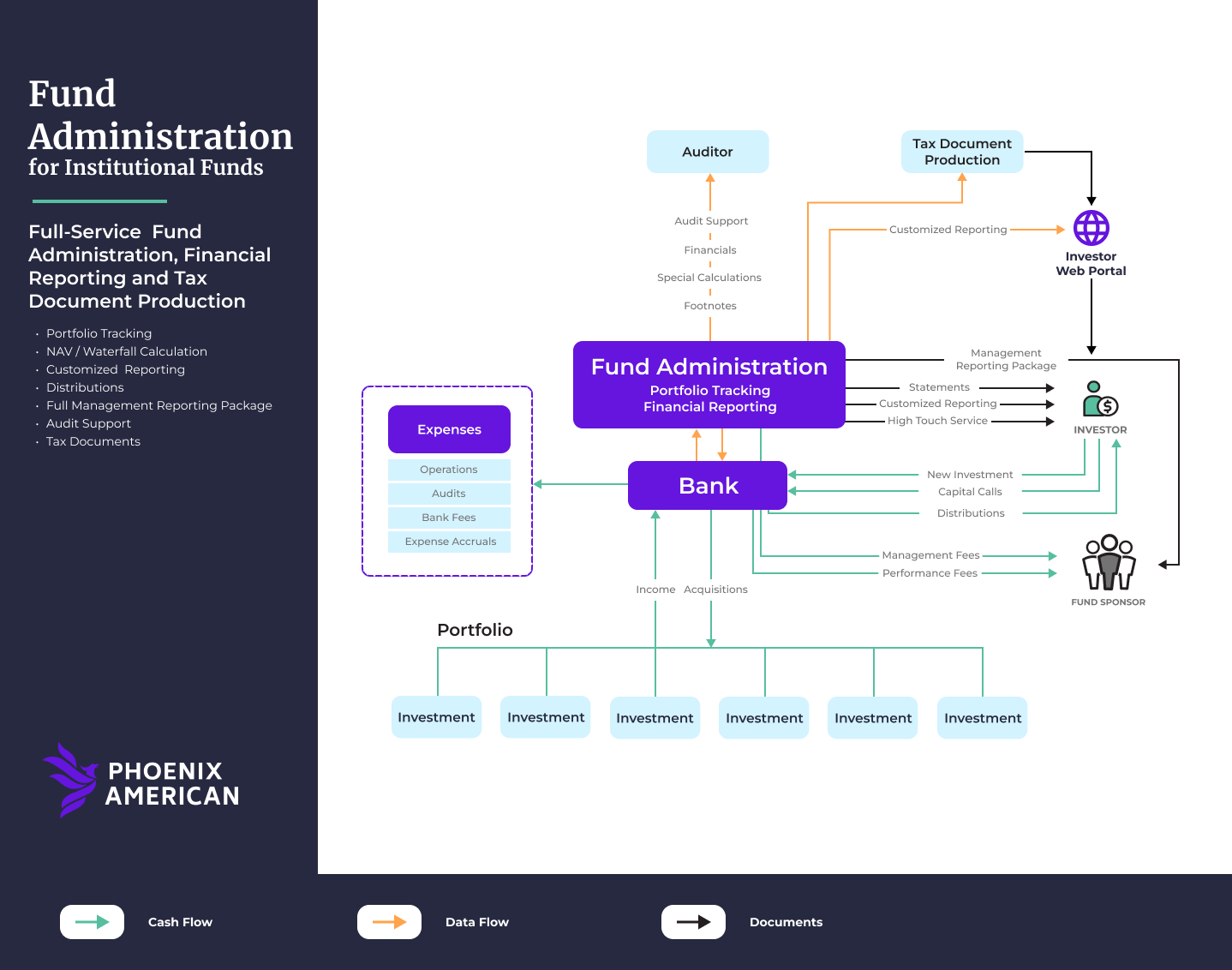Exacting Investors
Institutions are the largest and most demanding investors in alternative funds. These organizations pool large sums of money and invest in a wide variety of financial instruments. They, therefore, insist on thorough visibility into portfolio assets requiring extensive fund administration capability from portfolio fund sponsors. From the fund administration perspective, the most important consideration of institutional investors is that they represent and must serve the interests of many stakeholders.
- Pension Funds invest contributions from employees and employers.
- Insurance Companies invest policyholder premiums to pay future claims.
- Endowments and Foundations invest donated funds to support their operations and initiatives.
- Family Offices invest the assets of multiple descendants of a wealthy family.
- Sovereign Wealth Funds invest a country’s reserves for long-term benefits.
- Banks and Financial Institutions invest for both their own accounts and for their clients.
Institutions are subject to rigorous regulatory requirements and internal commitments and are, above all, accountable to their stakeholders. Fund sponsors raising capital from institutional investors must have fund administration in place that supports that accountability. Institutional grade fund administration must meet certain standards, support exacting service needs and accommodate investor requirements for customization.
Institutional Standards for Fund Administration

The SOC Audit
A Service Organization Control (SOC) audit assess the internal controls of a fund administration firm to ensure information security and data protection. Its purpose is to provide assurance to clients and stakeholders that the fund administration firm manages data with integrity and confidentiality, maintains privacy, and has effective operational controls in place. SOC audits help in building trust and transparency, ensuring that the organization adheres to high standards of data handling and security practices. Many institutions require portfolio fund administration providers to be SOC audited.
SEC-Registered Transfer Agent
A fund administration firm for institutional funds should be an SEC-registered transfer agent, an entity, authorized by the U.S. Securities and Exchange Commission (SEC), to manage the recordkeeping and processing of securities transactions. This includes maintaining records of ownership, handling lost or destroyed certificates and managing the issuance and transfer of securities. Registration with the SEC ensures that a fund administration firm complies with federal transfer agent regulations, thereby safeguarding the integrity and efficiency of transactions.
STA Guidelines
The Securities and Transfer Association (STA) is a professional organization that represents fund administration firms in their transfer agent role. The STA focuses on regulatory and compliance issues, offering operational best practices guidelines for members. It plays a crucial role in shaping fund administration industry standards. The association aims to maintain the integrity and effectiveness of the securities transfer system. Fund administration providers for institutional funds should adhere to STA guidelines for operational practices.
Meeting Service Needs
Reporting
An institution invested in a private equity fund requires specific financial reporting from fund administration to ensure transparency and compliance. Portfolio funds must have fund administration able to meet these needs. They include detailed reports on the fund’s performance, valuation of investments and the allocation of costs and profits. Reporting must give the institution insight into portfolio companies, their financial health and strategic developments. Institutions also require insights into fund investment strategies, risk management practices and market trends affecting its portfolio. Fund administration must provide accurate and timely financial statements crucial for meeting regulatory requirements, adhering to internal commitments and making informed investment decisions.
The ILPA Reporting Template
The Institutional Limited Partners Association (ILPA) reporting template mandates standardized disclosure for private equity funds. It requires fund administration produce detailed information on fees, expenses, carried interest and capital calls. The template also calls for clear reporting on fund performance, including gross and net returns, and portfolio company investments. Its aim is to enhance transparency and comparability, aiding limited partners in understanding and managing their private equity investments efficiently. Many institutions require reporting that adheres to the ILPA reporting template from portfolio funds. Fund administration firms must be familiar with and capable of producing the very demanding ILPA reporting template for institutional funds.
Service
Institutional investors require high-touch customer service from portfolio fund administration to manage large, complex investment portfolios effectively. Only exceptional service levels ensure timely, accurate information and personalized support, aiding in informed decision-making. High-quality service from fund administration also fosters trust and reliability, crucial for long-term investment relationships. It helps navigate regulatory compliance, and addresses specific needs and queries efficiently. Superior customer service is a high priority for these investors to achieve their financial objectives and maintain the integrity of their investment strategies.
Customizations
Due to their unique investment strategies, risk profiles and regulatory requirements, institutional investors require customized services from fund administration. These investors often manage large, diversified portfolios and have specific standardized needs for detailed, accurate information to make informed investment decisions. Customization allows for targeted insights into fund performance, risk exposure and alignment with their investment goals. Fund administration’s tailored reporting also helps institutions in meeting specific compliance and fiduciary obligations. Customization also facilitates effective monitoring and management of investments, enabling institutional investors to optimize their allocations and achieve their specific financial objectives within the private equity space.
Professionalized Fund Administration
Institutional investors very often require private equity funds to have professional fund administration to ensure operational efficiency, compliance with regulatory standards and accurate financial reporting. In-house fund administration at the portfolio fund level is considered an unacceptable operational risk for institutions. Professional fund administration brings expertise in complex fund structures and investment strategies, ensuring diligent management of capital calls, distributions and valuation processes. This expertise is vital for maintaining transparency, managing risk, upholding fiduciary responsibilities and safeguarding the interests of all the stakeholders.




